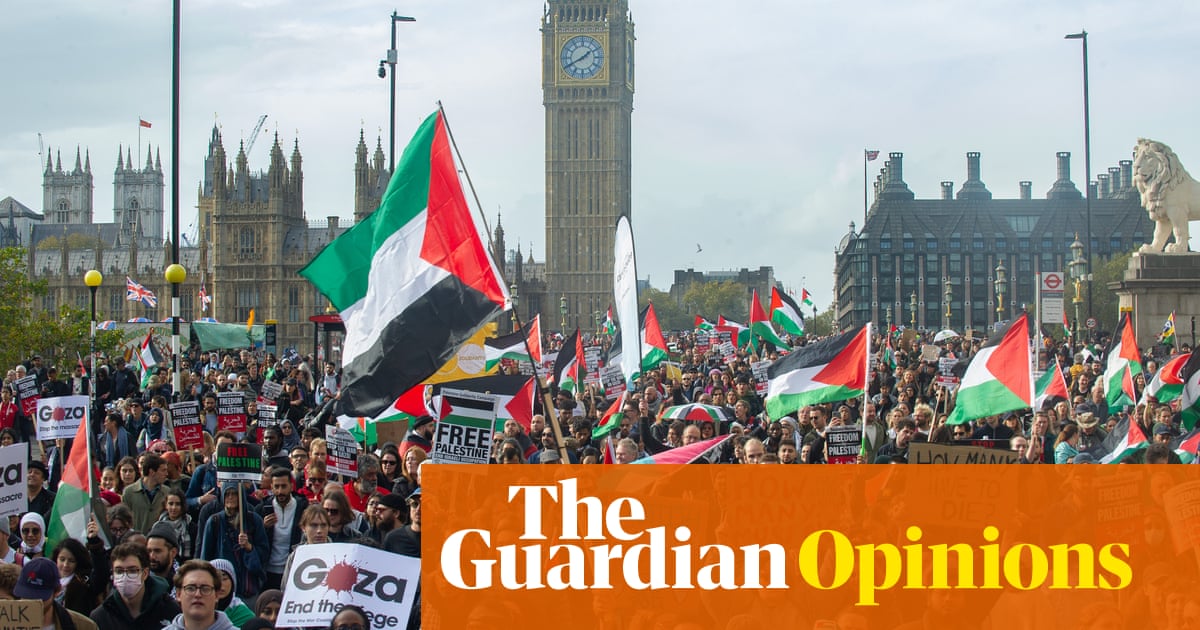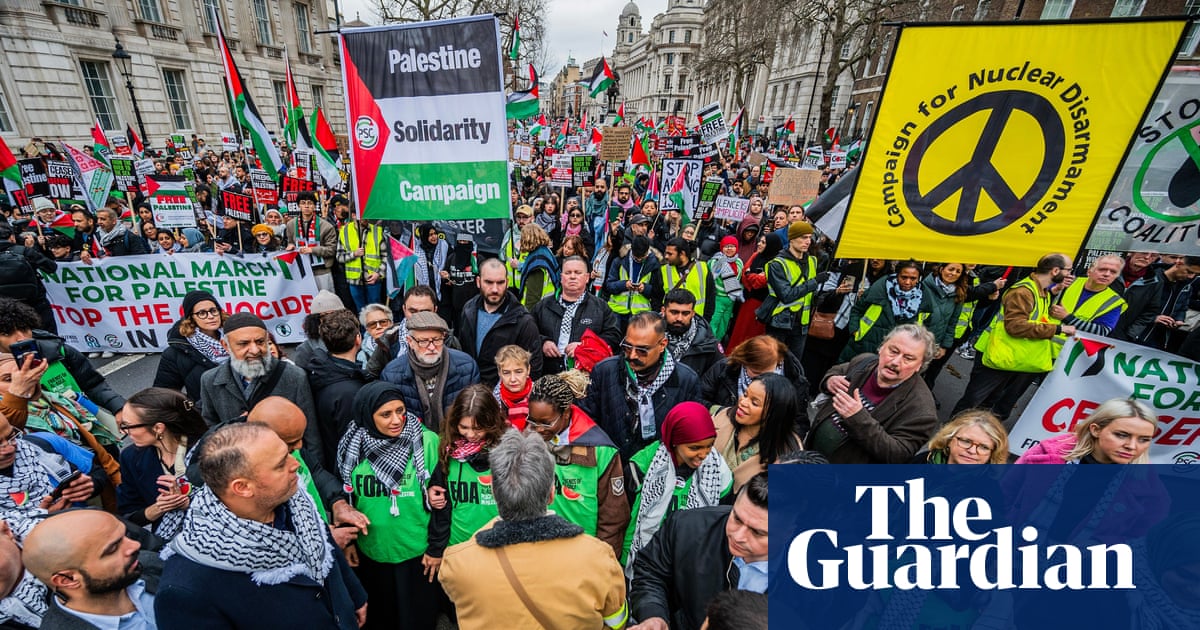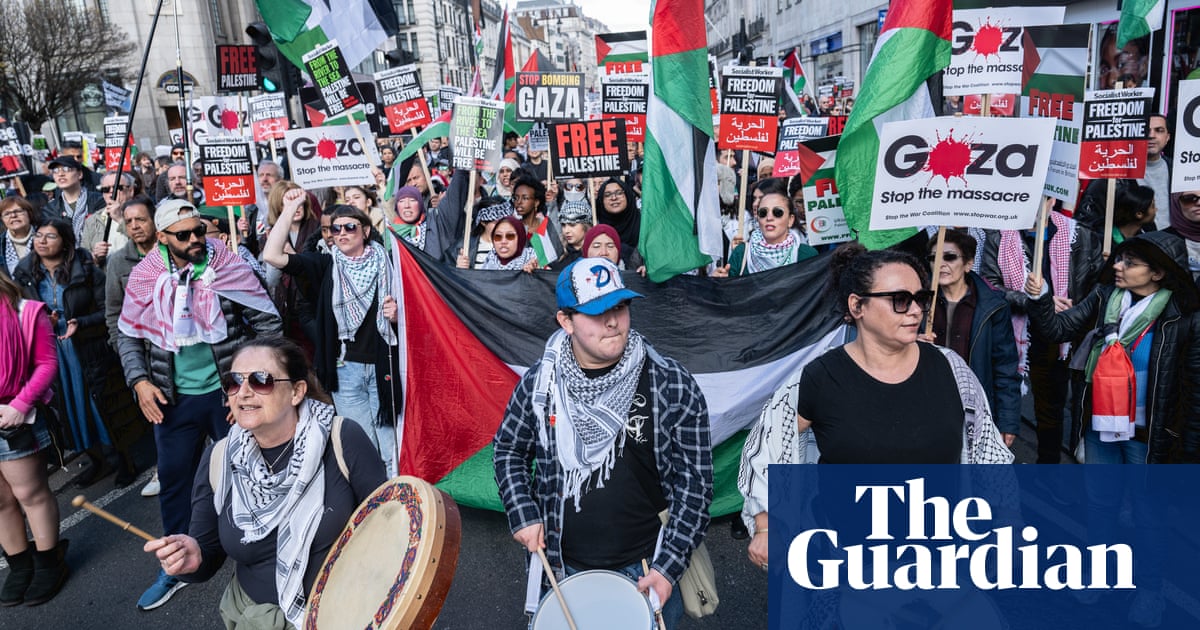
As the streets fill with ever-increasing numbers of pro-Palestine supporters – and with a large protest planned in central London next weekend – British politicians and commentators are coming up with new ways of describing what is happening: from “hate marches”, in the words of home secretary Suella Braverman, to empty displays of “virtue signalling”. The prime minister, Rishi Sunak, has already called next weekend’s march, which coincides with Armistice Day, “provocative and disrespectful”. But each attempt to cast this movement as menacing is really a refusal to try to understand what is going on. The truth is that a large number of people in Britain can feel strongly about the situation in Gaza while not being “obsessed” with Palestine or motivated by terrorist sympathies.
Some will be wary of these marches in good faith, and understandably so. Reported antisemitic hate incidents in Britain are rising, and Hamas’s 7 October atrocities have shaken a Jewish diaspora, which saw its mourning immediately eclipsed by sympathy for Gaza. Support for Palestine might seem suspect from a public that does not turn out for many other similar causes. Why does this one issue bring so many out on to the streets, when so many other injustices around the world are met with silence?
The answer is not entirely straightforward, but nor is it sinister. Palestine is not the world’s only injustice, but it is singularly resonant. There is a historical durability and consistency to the conflict – all those years of illegal occupation, displacement, dispossession and resettlement – that gives it a shape and place in the public mind that others lack. It is also an injustice that is endorsed and enabled by western governments, which arm Israel in conflict and refuse to condemn its actions. Protest is not just directed at Israel, but at domestic governments and politicians who are seen as having a hand not just in the subjugation of stateless Palestinians, but in crafting an entire moral framework for it. As the death toll in Gaza approaches an estimated 10,000, the claim that the loss of life is warranted by Israel’s open-ended “right to defend itself” becomes increasingly untenable.
The Palestinian cause has long been part of an interconnected struggle for self-determination and equality for the international left. But increasingly it also sits at the intersection of contemporary global and economic discontents – and has become incorporated into the movement for social and racial justice. In 2021, Black Lives Matter released a statement announcing “solidarity with Palestinians”; murals of George Floyd appear in Gaza and the West Bank. Social media has made this internationalism more accessible. The heavily armed soldier or policeman with his foot on someone’s neck, the checkpoints and segregated streets and neighbourhoods – these images resonate with the past and present of people who have experienced power behave with impunity, who sense in their own societies a disparity in the value of people’s lives.
There is a universal simplicity to the conflict that transcends political ideology – about the fundamental human right to full nationhood, to live in your home in safety and with dignity. As the journalist Ta-Nehisi Coates recently explained in an interview, after he visited the occupied territories, what he saw revealed to him “just how uncomplicated it actually is”. “You don’t need a PhD in Middle Eastern studies,” he said, “to understand the basic morality of holding a people in a situation where they don’t have basic rights.”
But these protests must also be understood as a legacy of the “war on terror”, which was justified on the basis of morality and security – the fate of women in Afghanistan, or the threat of annihilation – yet was exposed as little but vengeful wrath and the blundering projection of power. The legacy of those two decades has been a bitter harvest – millions dead, terrorist organisations exploiting destabilisation in the Middle East, Islamophobia, the curtailing of civil liberties, and a lingering sense that we cannot trust our leaders or the political system that ensured they faced no consequences. It should be no surprise that when you try to convince people that on the issue of Palestine they should trust their government, you are met with a sceptical reception.
Protest is a funny thing. It is a mixture of the rational, the emotional and the tribal. And far from it being a mark of aggression, it is often an expression of helplessness, frustration and a lack of influence in politics. You can try to identify outliers in order to tease out some nasty extremism or preening, ignorant vanity, but often what is at the heart of it all is a general feeling of something simply being not on, and that those telling you to go home and believe that they know best cannot be trusted. Perhaps there is another motivation, too – of comfort and reassurance in an atomised society, in finding others to walk with you and take your beliefs seriously, especially when they are not represented or taken seriously elsewhere.
The refusal to consider that there just might be something worth engaging with, when hundreds of thousands of people are taking to the streets, is not all about disagreement or fear of what might be unleashed. Protest in wartime is generally easy to sneer at because it broadly doesn’t work, and is seen as frivolous and pointless at a moment when the stakes are high on the ground elsewhere. “During the Vietnam war,” said Kurt Vonnegut, “every respectable artist in this country was against the war. It was like a laser beam. The power of this weapon turns out to be that of a custard pie dropped from a stepladder six feet high.” But it does matter, even if the consequences aren’t immediate. The fact that the immorality and recklessness of the Vietnam war was vocalised made its folly more concrete once it was over – it couldn’t be dismissed as hindsight. The tragedies of the Iraq war were clearly foreseen by many people, and so their architects cannot style out their poor decisions as breezily as they would like.
That is why it is a bad idea to simplify or dismiss popular support for Palestine. It draws, consciously or not, on the lessons of the past and the frustrations of the present. They may not have a PhD in Middle Eastern studies, but in the long run, the instincts of those who have argued for restraint, compassion, adherence to international law and the bloody pointlessness of reprisal have been proved right. As parts of the Middle East looks to be destabilised, they might be yet again.
Nesrine Malik is a Guardian columnist












